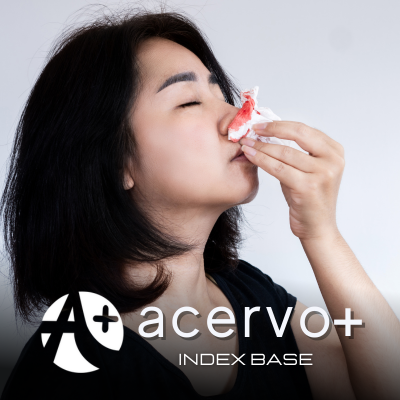Tratamento da epistaxe: novas abordagens clínicas
##plugins.themes.bootstrap3.article.main##
Resumo
Objetivo: Revisar a literatura sobre o tratamento da epistaxe, ou sangramento nasal. Revisão bibliográfica: O Ácido Tranexâmico (TXA), que se mostrou eficaz em diferentes contextos, incluindo pacientes que usam antiagregantes plaquetários. O TXA foi superior a outras intervenções, proporcionando hemostasia mais rápida, menor taxa de recorrência e maior satisfação do paciente. A administração oral, intranasal e tópica do TXA demonstrou sua versatilidade. Além disso, a aplicação tópica intranasal do TXA foi eficaz, reduzindo a necessidade de tamponamento nasal e ressangramento em 24 horas. Resultados: Estudos comparativos confirmaram a superioridade do TXA sobre adrenalina, tetraciclina e tamponamento nasal anterior no tratamento da epistaxe. No entanto, é necessário considerar diferenças metodológicas entre os estudos e ampliar as pesquisas para confirmar e expandir seus benefícios.
##plugins.themes.bootstrap3.article.details##
Copyright © | Todos os direitos reservados.
A revista detém os direitos autorais exclusivos de publicação deste artigo nos termos da lei 9610/98.
Reprodução parcial
É livre o uso de partes do texto, figuras e questionário do artigo, sendo obrigatória a citação dos autores e revista.
Reprodução total
É expressamente proibida, devendo ser autorizada pela revista.
Referências
2. GRENCHESKI, et al. Bleeding frequency during physiotherapy in thrombocytopenic patients undergoing hematopoietic stem cell transplantation. PLoS One. 2021; 16(7): 0255413.
3. HAJIMAGHSOUDI M e LARGANI HA, et al. A novel method for epistaxis management: Randomized clinical trial comparing nose clip with manual compression. Am J Emerg Med. 2018; 36(1): 149-150
4. HOSSEINIALHASHEMI M, et al. Intranasal Topical Application of Tranexamic Acid in Atraumatic Anterior Epistaxis: A Double-Blind Randomized Clinical Trial. Ann Emerg Med. 2022; 80(3): 182-188.
5. KHANWALKAR AR, et al. Randomized, controlled, double-blinded clinical trial of effect of bevacizumab injection in management of epistaxis in hereditary hemorrhagic telangiectasia patients undergoing surgical cauterization. Int Forum Allergy Rhinol. 2022; 12(8): 1034-1042.
6. KOÇAK HE, et al. Comparison of topical treatment methods used in recurrent anterior epistaxis: a randomized clinical trial. Braz J Otorhinolaryngol. 2021; 87(2): 132-136.
7. KROON SH, et al. Oral itraconazole for epistaxis in hereditary hemorrhagic telangiectasia: a proof-of-concept study. Angiogenesis. 2021; 24(2): 379-386.
8. KRULEWITZ NA e FIX ML. Epistaxis. Emerg Med Clin North Am. 2019; 37(1): 29-39.
9. LEE JM, WU V e FAUGHNAN ME, et al. Prospective pilot study of Floseal® for the treatment of anterior epistaxis in patients with hereditary hemorrhagic telangiectasia (HHT). J Otolaryngol Head Neck Surg. 2019; 1548(1): 48.
10. LOU Z e WEI H. Identification of bleeding sites and microwave thermal ablation of posterior epistaxis. Acta Otolaryngol. 2019; 139(1): 70-74.
11. MACDONALD S, et al. Characterization of a large cohort of patients with unclassified bleeding disorder; clinical features, management of haemostatic challenges and use of global haemostatic assessment with proposed recommendations for diagnosis and treatment. Int J Lab Hematol. 2020; 42(2): 116-125.
12. MCWILLIAMS JP, et al. North American Study for the Treatment of Recurrent Epistaxis with Doxycycline: The NOSTRIL trial. J Thromb Haemost. 2022; 20(5): 1115-1125.
13. MURRAY MH, et al. Management of Persistent Epistaxis Using Floseal Hemostatic Matrix vs. traditional nasal packing: a prospective randomized control trial. J Otolaryngol Head Neck Surg. 2018; 47(1): 3.
14. PETERSON LK et al. Efficacy of Timolol in a Novel Intranasal Thermosensitive Gel for Hereditary Hemorrhagic Telangiectasia-Associated Epistaxis: A Randomized Clinical Trial. JAMA Otolaryngol Head Neck Surg. 2020; 146(11): 1006-1014.
15. REUBEN A, et al. The Use of Tranexamic Acid to Reduce the Need for Nasal Packing in Epistaxis (NoPAC): Randomized Controlled Trial. Ann Emerg Med. 2021; 77(6): 631-640.
16. SOSUAN GMN, et al. A randomized controlled trial on the effects of oxymetazoline nasal spray after dacryocystorhinostomy among adult patients. BMC Res Notes. 2020; 13(1): 236.
17. TEO WY, et al. Outcome of childhood epistaxis with treatment of allergic rhinitis: a randomized controlled study. Eur J Pediatr. 2023; 182(3): 1127-1135.
18. WOMACK JP, et al. Epistaxis: Outpatient Management. Am Fam Physician. 2018; 98(4): 240-245.
19. ZAHED R, et al. Topical Tranexamic Acid Compared with Anterior Nasal Packing for Treatment of Epistaxis in Patients Taking Antiplatelet Drugs: Randomized Controlled Trial. Acad Emerg Med. 2018; 25(3): 261-266.

